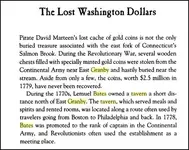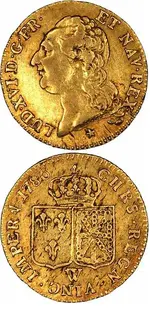tommyl since you found a reference to bates and tavern and the story of the gold and
since the article was wrote in 1921, could it be the story had been embelshised over the years,
maybe there is a treasure just not that sum
your article
http://www.marxists.org/archive/beard/history-us/ch06.htm
found a note here for lemuel bates, and a couple of other people under his command
might help with your research
http://freepages.genealogy.rootsweb.ancestry.com/~genealogy123/tree01-07-2003/np5.html
Note for: Hezekiah Holcomb, 27 JAN 1726/27 - ABT. 1794 Index
--------------------------------------------------------------------------------
Database: Daughters of the American Revolution Lineage Books (152 Vols.)
Combined Matches: 3
The National Society of the Daughters of the American Revolution Volume 17
page 40
Mrs. Harriet Matilda Merwin Briggs.
DAR ID Number: 16100
Born in Granby, Connecticut.
Wife of Fred L. Briggs.
Descendant of Capt. Lemuel Bates, Capt. Hezekiah Holcomb, Hezekiah Holcomb, Jr., Phineas Griswold and Peter Van Dyke.
Daughter of Henry Merwin and Julia Matilda Holcomb, his wife.
Granddaughter of Lemuel Cicero Holcomb (1796-1880) and Julia Griswold, his wife; Jesse Merwin and Jane Van Dyke, his
wife.
Gr.-granddaughter of Hezekiah Holcomb, Jr., and Dorothy Bates, his first wife; Peter Van Dyke and Maria Youland, his
wife; Phineas Griswold and Vashte Bates, his wife.
Gr.-gr.-granddaughter of Hezekiah Holcomb and Susanna Alderman, his wife; Lemuel Bates and Deborah Lewis, his wife.
Lemuel Bates, (1729-1820), was appointed ensign of the Alarm company, Eighteenth regiment, 1777, and captain, 1778.
He was born in East Granby, Conn., where he died.
Hezekiah Holcomb, (1726-94), commanded a company in the Eleventh regiment of militia in the New York campaign, 1776.
He was born in Simsbury, Conn., where he died.
Also No. 14578.
Hezekiah Holcomb, Jr., (1750-1820), was a member of the Alarm company from Simsbury, 1779, under Capt. Lemuel Bates.
He was born in Simsbury, Conn., and died in Granby.
Phineas Griswold, (1750-89), served as private in Capt. David Barber's company, First regiment militia. He re-enlisted
, 1777, for three years in Capt. John Harmon's company on duty in New York and was detailed to guard Burgoyne's prisoners.
He was born in Windsor, Conn., where he died.
Peter Van Dyke, (1767-1810), served as a drummer boy in the New York levies, 1780, in Capt. Isaac Bogart's company for
the defense of the frontier. He was born in Kinderhook, N. Y., where he died.
a list of lemuel bates
http://www.myheritage.com/FP/smart-research-search.php?offset=0&l=bates&f=lemuel
Lemuel Bates more info must be a member
http://www.myheritage.com/person-4002977_1_440903/Lemuel-Bates
login join My Heritage Genealogy
http://www.myheritage.com/
......................................................................
if there is a treasure, its not in the mines
http://books.google.com/books?id=yx...necticut++Richard+Phelps#v=onepage&q=&f=false
more books
http://books.google.com/books?q=Newgate+in+Connecticut++Richard+Phelps&btnG=Search+Books
==============================================================
stolen from revolutionary war troops, IE:2 million dollar, not sure they had enough money,
all in one place, at any given time, maybe there is a treasure just not that sum
The Men Behind the American Revolution: Robert Morris by: Rick Brainard
"He slashed all governmental and military expenditures, personally purchased army and navy supplies, tightened
accounting procedures, prodded the states to fulfill quotas of money and supplies, and when necessary strained
his personal credit by issuing notes over his own signature or borrowing from friends
Morris used in part, the above method and a loan from France to fund Washington's Yorktown campaign. He used a
portion of this loan and his own personal fortune to fund, and charter the First Bank of North America that same year.
http://www.history1700s.com/articles/article1141.shtml
-----------------------------------------------------------------------
Depreciation of Paper Currency during the Revolution
Gold and/or silver coins, often referred to as "specie", were commonly used as payment for goods or services rendered
in the colonial period. The problem with specie was that each Colony rated the coins differently and there were a
wide variety of coins in circulation: English coins, French coins, Spanish coins, Portuguese coins, etc…. Because
colonial authorities frequently revised exchange rates to encourage and discourage the use of certain coins in
circulation, there was a lack of consistency in determining the value of foreign currency among the colonies. These
issues were minimal in comparison to the ones paper money would cause during the Revolution.
http://mybrothersamisdead.historyofredding.com/my-brother-sam-is-dead_money.htm





